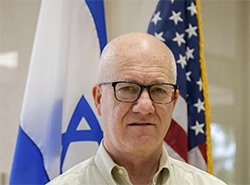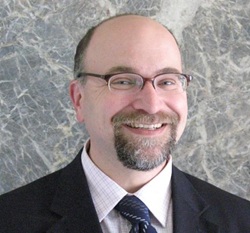10/16/2025
Praying for Peace, Protected by Guns

A Cuyahoga County Sheriff's Department vehicle sits outside Landerhaven in Mayfield Heights as more than 1,200 community members gather for the Jewish Federation of Cleveland's 10-7-23 Commemoration on Oct. 5, 2025. CJN Photo / Bob Jacob
About this series
Impact of Hate, a new CJN series, aims to shed light on the rising tide of hate affecting our community. This ongoing feature will go beyond individual incidents to explore how hatred impacts our children, families, communities, and country as a whole.
Reporting and writing on this series for the CJN is David Hertz, a former Akron Beacon Journal newsroom editor, CJN columnist Regina Brett, and periodic guest contributors.
Article reprinted with permission from Cleveland Jewish News.
by David Hertz

Baratz
The congregants at Congregation Mishkan Or had just settled. Hundreds turned their attention to the bimah and awaited the first solemn notes of Kol Nidre, one of the most moving melodies of the High Holy Days. But before the gathering of Jews could begin their Yom Kippur service, Rabbi Yael Dadoun made an announcement.
“Should you need to leave quickly, please note the nearest exit,” she said, and asked the congregation to read the security notification in the High Holy Days bulletin distributed as people entered the Beachwood temple.
“Note, we have additional armed guards for all services and 24/7 surveillance through strategically placed security and cameras inside and out,” the bulletin stated. “If you SEE something, SAY something to the nearest guard.”

Rhines AJN Photo / Jimmy Oswald
Minutes later, with the chords of Kol Nidre still resonating, Dadoun led the congregation in the Jewish Prayer for Peace.
Grant us peace, your most precious gift,
O Eternal source of peace,
And give us the will to proclaim its message to all the peoples of the earth…….
Such are the conditions and contradictions under which we worship in 2025. Three days earlier, a gunman had driven his truck into a church in Grand Blanc Township, Mich., to shoot, kill and burn. Authorities say Thomas Jacob Sanford murdered four people, including a 6-year-old, and burned their Mormon church to the ground. Sanford died in a shootout in the parking lot. Authorities continue to investigate, but White House Press Secretary Karoline Leavitt provided a likely motive. Sanford, she said, “hated people of the Mormon faith.”

Blain
Hate-fueled attacks against people in worship are not limited to the United States. On Yom Kippur, a man attacked Jews outside a synagogue in Manchester, England, in what British authorities are calling an act of terrorism. Two people died and the assailant was killed.
An increase in hate in the past 20 years has redefined the need for security within the U.S. Jewish community, Oren Baratz, senior vice president of JFC Security, LLC, the Jewish Federation of Cleveland’s security provider, told the Cleveland Jewish News.
The attacks at the Pittsburgh Tree of Life Synagogue in 2018 – 11 killed – and at Chabad of Poway in San Diego a year later – 1 killed – “brought to the attention and awareness that the Jewish communities here are not as safe as they thought they were,” Baratz said.
Bless our country,
That it may always be a stronghold of peace,
And its advocate among the nations.
Since 2012, mass shootings at U.S. houses of worship have risen sharply, often fueled by hatred of religion, race, or nationality, creating a public safety imperative. Federal data show that two-thirds of such attacks stem from bigotry. The COVID-19 pandemic briefly slowed the trend, but violence has since surged again, mirroring global unrest, particularly the war in Gaza.
In September, less than three weeks before the Michigan shooting, the Faith-Based Information Sharing and Analysis Organization, a membership group of faith institutions based in Virginia, released its second annual analysis of Attacks On Houses of Worship. It found fewer total attacks in 2024 than in the previous year, but reported a 33% increase in those causing casualties. Furthermore, attacks against Jewish, Muslim, and Catholic congregations accounted for 44% of all incidents in 2024, even though their congregations represent less than 10% of the houses of worship in the United States.
May contentment reign within its borders,
Health and happiness within its homes.
For Daniel Blain, the perilous connection between the vulnerability of worshipers and hate has concerned him since the 9/11 attacks in 2001.
“When I attended services, I would look at the big, beautiful windows” and consider the vulnerability of houses of worship, said Blain, the CEO of JewishAkron.
Speaking to the CJN hours before Kol Nidre services, Blain remained shaken by the Michigan attack.
“I think about those poor people in the church,” he said. “They were doing something peaceful, connected, positive.”
The increase of antisemitism in the United States since the Oct. 7, 2023, surprise attack by Hamas in Israel have amplified Blain’s safety concerns. Since 2022, the financial burdens associated with security of the Akron and Canton Jewish communities have increased seven-fold, from $50,000 a year to $350,000, he said.
As director of community security at JewishAkron, Gary Rhines is responsible for the safety of congregants at six synagogues in Akron and Canton, the Hillel and Chabad facilities at Kent State University, as well as the families that frequent the Shaw Jewish Community Center complex in Akron. He often coordinates with local police and the Jewish Federation of Cleveland to help ensure the safety of Northeast Ohio’s Jewish community. He started working for Blain in 2023.
“It’s unfortunate that people have to have armed security at these events,” Rhines told the CJN. The increased hatred since Oct. 7 is affecting people who come to worship, he said.
“I’ve had people come up and just hug me,” he said. “They are saying that they really appreciate me being there to watch over their kids.”
Strengthen the bonds of friendship
Among the inhabitants of all lands.
The Jewish Federation of Cleveland spends more than $6 million to coordinate security at Jewish institutions across Northeast Ohio, Baratz said. While the Federation focuses on advising close to 100 Jewish institutions to improve their security, officials also recognize the threat other religious institutions face. As a result, the Federation has formed a bond with officials at non-Jewish organizations to help them protect themselves, Baratz said.
“Hate is hate is hate,” he said.
“Cleveland is in the top group of federations and communities that are investing in their security,” he said. “Communities around the United States come to Cleveland to learn what we are doing here. The level of cooperation we have with local law enforcement is second to none.”
In 2021, the Jewish Federations of North America, the Jack, Joseph and Morton Mandel Foundation in Cleveland and other philanthropic organizations launched LiveSecure, to help Jewish communities finance and enhance security measures.
“It changed Jewish community security around the United States,” Baratz said.
LiveSecure collaborates with the Secure Community Network, which helps Jewish organizations collaborate with federal agencies to keep the Jewish community safe. In 2022, Baratz joined JFNA to advise on LiveSecure, and in 2025, he joined SCN.
Before the LiveSecure initiative, there were only 25 security directors in the United States dedicated to Jewish communities, Baratz said. Now, there are over 100, serving most of the 146 federations and a few hundred network communities without federations.
“The vast majority are covered and advised by security professionals. And that is all done with LiveSecure,” he said.
And may the love of Your name
Hallow every home and every heart.
“In the last 20 years, we are seeing more and more expressions of hate,” Baratz said. “Not just against the Jewish community. There are more and more real expressions of violence against the Jewish community.”
Security, worship and prayers for peace are incongruent for some. In 2013, when Baratz began working in security with the Federation, there was a definite reluctance to embrace security measures at synagogues and other institutions.
“Schools and synagogues and other facilities felt that having security would create an unhealthy, unwelcoming culture,” he said. “Today, we are past that. Leadership of facilities are not only welcoming it, but wanting us.”
Inscribe us in the book of life, blessing, and peace.
We praise You, O G-d, the Source of peace.
Five months ago, JFC Security, LLC began working with Cleveland-area synagogues B’nai Jeshurun Congregation in Pepper Pike, Green Road Synagogue in Beachwood and Congregation Mishkan Or to train volunteers on how to respond to a security breach. Baratz said he hopes to expand the program relatively soon.
“It’s part of the tragedy of what we have to do today,” he said. “Security is a tool. It’s not a goal. The goal is to allow the community to continue to operate in a healthy way and if, because of security, people feel they cannot do it, then security failed. It’s a very fine line that we walk every day.”
Will the need for multi-million dollar investments in security end anytime soon? Will the impact of hate shrink and prayers for peace be answered? Will worship in synagogues no longer be associated with a need for armed guards?
In Akron, Cleveland and across the country, the answers are found in the dismal trends of hate targeted at houses of worship and the people who frequent them.
“Security of the Akron Jewish community is at the forefront of everything I do,” Blain said. “How do you balance all that and still offer a warm and welcoming place? I think that’s hard. The Jewish community will not feel safe until the conflict in Gaza is over.”
David Hertz is a former newsroom editor at the Akron Beacon Journal and a life member of the Cleveland Jewish Publication Company Board of Directors. He is writing for the CJN pro-bono as a freelance journalist.

